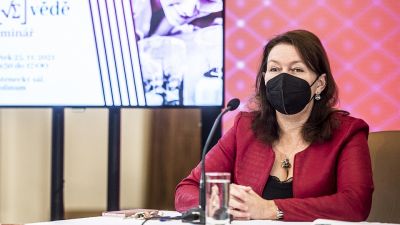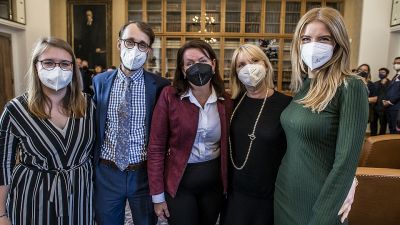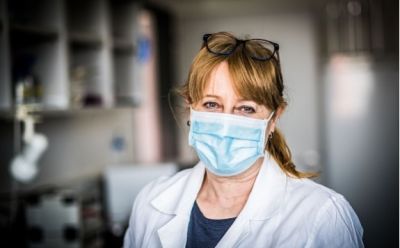Friday, 11 February, marks the seventh International Day of Women and Girls in Science, celebrating the role of women in the scientific world and promoting gender equality. What do female scientists from Charles University enjoy the most about their work and what kind of challenges do they face? We asked a number of scientists to share their stories.

Female scientists at CU. Top row from left: Anna Shavit, Lenka Rovná, Milena Králíčková, Martina Tóthová, Kateřina Rohlenová.
Bottom row: Jitka Palich Fučíková, Markéta Supa, Anežka Kuzmičová, Nina Špitálníková.
More than 36,000 women study and work at Charles University and 53 percent of the total number of CU employees are women. Ideal as that might seem, the picture suffers up close, when one looks at disproportion of female associate professors and technical and economic support (THP) staff. Like other universities and research institutions around the world, Charles University has a shortage of women in science and leadership positions. According to UN data, the proportion of women in science and research is 33 per cent, which is roughly in line with the European Union average. The Czech Republic, however, ranks last – far below the European average – with 27 percent of female scientists. The number of women who work in academic and scientific positions at Charles University is 40 percent (more detailed data in the annual report).

The above graph highlights areas that are more balanced (largely students) and the greatest disproportion between male and female staff - the percentage of female professors (in pink)..
Thankfully, the topic of women in science is increasingly being addressed: in 2021, a much anticipated full-day conference on Women in Science was held at Charles University, where it was noted that while things were certainly changing for the better, many stereotypes remain as well as other challenges. Participants at the conference pointed out that there is still a lack of systemic solutions to make up the gender gap: the fact that, for example, women are able to successfully combine childcare and scientific work often relies only on the good will of individuals. Participants recommended taking inspiration from abroad and reiterated the need for more support and flexibility for women scientists (you can read our report on the conference here).

Female scientists at CU. Top row from left: Adéla Čmoková, Lenka Machová, Eliška Selinger, Magdalena Bohutínská.
Bottom row: Ruth Tachezy, Zuzana Musilová, Klára Klimešová.
It is of course impossible to generalise when it comes to women scientists each is different. Each has a unique life story, motivation and research topic. That is why we regularly feature specific stories of women scientists in the online magazine Forum under the tag #WomenScience. On the occasion of today's holiday, Forum selected three remarkable stories to share.

Female scientists at CU. Top row from left: Diana Apetauerová, Dagma Dzúrová, Helena Pivoňková.
Bottom row from left: Mariya Shamzhy, Iva Holmerová, Ilona Hromadníková.
First story: I didn't want to be a scientist, but the brain is so interesting…
Karolína Korvasová is a “math-biology enthusiast”: she started with a bachelor's degree in mathematics at the Faculty of Mathematics and Physics of Charles University, went to the Netherlands for a master's program with a focus on mathematical biology, then headed to Australia for an internship and got her Ph. D. in Germany. Since last January, she has been working again at CU’s Faculty of Mathematics and Physics in the Computational System Neuroscience group, where she models visual systems.
She didn't plan on being a scientist. “I didn't set out to be a scientist; quite the opposite, I didn't believe I had what it takes. I was studying mathematics, so I was kind of heading towards science from the beginning, but I was also thinking about other career options, like data analysis. The fact that I'm a scientist today is a confluence of events - there was always a new opportunity or topic that came up that interested me. It's actually brain's fault, it's so interesting that it drew me to science,” she says with a smile. She has two children, four and six, who were born while she was working on her Ph. D. in Germany. “I was very lucky to be able to be home with each of them for a year-and-a-half and then only work part-time. In Germany, this was a luxury however, and I got labelled an irresponsible scientist who didn’t care about the results of the group... But I wouldn't change a thing: I really appreciate that I had this opportunity," she says, describing the maternity leave in Germany and how unusual it is in the Czech Republic compared to other countries.
And how do the children view their scientist mum? “They know that I am researching the brain and that there are cells that communicate with each other. Sometimes we look at pictures of the measured data together, they really like that and are interested,” Korvasová says. You can read more about her research and why she was in Australia for a year, in Prague for a while, but eventually applied for a Ph. D. in Germany in another, separate article in Czech.

Karolína Korvasová from the Faculty of Mathematics and Physics, Charles University.
Second story: Science is a joy, you can dedicate your whole life to interesting topics
Alena Marková has been researching the contemporary history of Belarus, the country of her birth, for 10 years at the Faculty of Humanities, Charles University. She came to the Czech Republic in 2000, when she received a scholarship from the Czech government. “I am very grateful for that. Thanks to it, I graduated from Charles University with a master's degree and a Ph. D.,” she says, explaining that the decision to do science, and specifically science related to Belarus, came spontaneously. “Belarusian history is a part of me. For me, science is not just a job, it's also my hobby. If you really love something, you can't just do it from nine to five - it's part of your life and you want to know more and to understand better and better.”
She started doing science when her daughter Kristina was two “It was hard, but I had a lot of help from my family, especially my mom, Kristina's grandmother. That's what made me do it,” she says. "I don't share science itself with Kristina, but of course she sees how I work, how I take over archival materials... She herself goes to children's archaeology camps where they do digs and I think she enjoys it. Kids always tends to look at what the parents are doing - we set an example for them in good and bad ways,” she explains.
Now she cannot imagine doing anything else: “I solved that dilemma a long time ago. I began a second life in the Czech Republic; in Belarus I originally studied management and international relations and worked as a clerk in the Ministry of Economy. I dealt with customs and international trade issues... I understood that there are things I enjoy and don't enjoy. And I enjoy science, and I can't imagine going back to, say, clerical work, so I've solved that question.” Read more in Czech in our earlier interview.

Alena Marková from the Faculty of Humanities at CU.
Third story: I founded a non-profit and this experience is very useful in science
Lenka Šlachtová received a Primus grant and runs her own research group at the First Faculty of Medicine of Charles University, which specialises in the study of neurodegenerative diseases, especially amyotrophic lateral sclerosis (ALS) - a disease in which your muscles gradually weaken when you are fully conscious and we don't know how to treat it yet. In addition to research, years ago she founded ALSA, a non-profit that brings together patients and professionals working on ALS: “The non-profit experience is very useful in science. I can't imagine going straight from the lab to suddenly being the head of a research group - thanks to my experience in the non-profit world, I'm now better at dealing with budgets, contracts, or hiring new team members.”
She started the group with her six-month-old son, during the Covid pandemic, so her older daughter couldn't go to preschool. “It was horrible. The pandemic exposed a lot of the problems of the Czech system - even today you have to deal with a lot of things in person, even though it could have been done electronically a long time ago. Also, there is a lack of systemic support for mothers who are scientists; this is much better abroad,” she recounts. She has a comparison; her first daughter was born during a postdoc in the United States, when she returned to work after eight weeks and then took turns with her husband for care: “That's the other extreme, but they are prepared for it, there are places in institutions where you can feed your child in peace and privacy, there are baby groups...”
She considers international experience essential in a scientific career. “Returning to the Czech Republic and starting my own group made sense to me, I wanted to use the knowledge I had learned abroad and contribute to the knowledge of the genetic and epidemiological causes of ALS in the Slavic population, something that no one had ever done before,” she adds. Read more, in Czech, about the project and her personal motivation for this topic in our earlier interview. Šlachtová concludes: “Science is actually simple childhood curiosity, just on different topics. It's about asking questions and looking for answers that can lead to potential solutions to problems. There is a beautiful and wonderful creativity in doing science. And the opportunity to keep opening new doors of knowledge.”

Lenka Šlachtová from the First Medical Faculty of Charles University (in blue dress) with part of her team.
|
Female milestones at Charles University:
1897 The first women are admitted to study at the Faculties of Arts at Austrian universities
1900 Medical and pharmaceutical faculties of Austrian universities admit the first women to study
1901 Marie Zdeňka Baborová becomes the first graduate doctor of philosophy
1902 Anna Honzáková graduates from the medical faculty of a Czech university
1918 First women allowed to apply to study at the Faculty of Law
1925 Milada Paulová meets habilitation requirements as the first woman at a Czech university
1939 Milada Paulová is appointed the first female university professor
1985 JJana Synková becomes Vice-Rector (Second Faculty of Medicine)
1997 Eva Kvasničková from the Faculty of Pharmacy of Charles University is elected the first female dean
2022 Milena Králíčková becomes Rector (the first woman to head Charles University in 674 years)
|

















